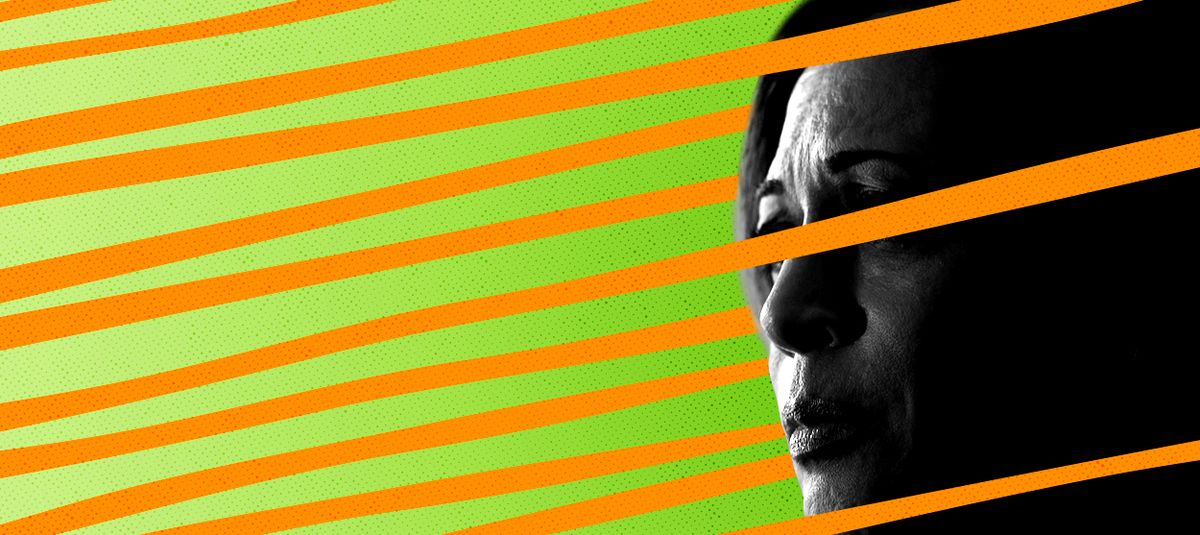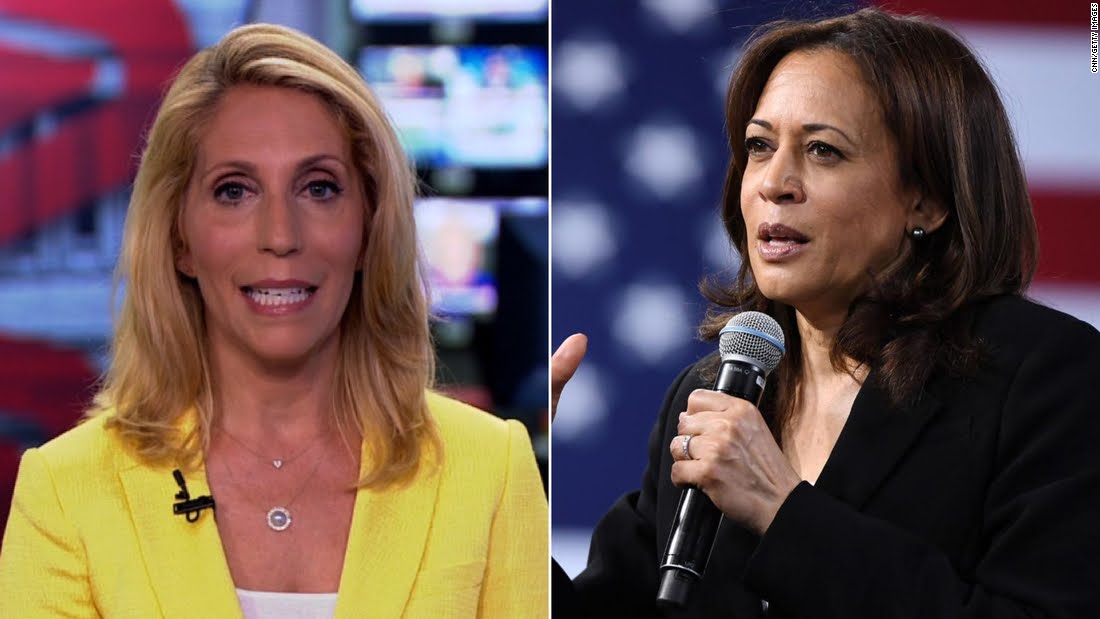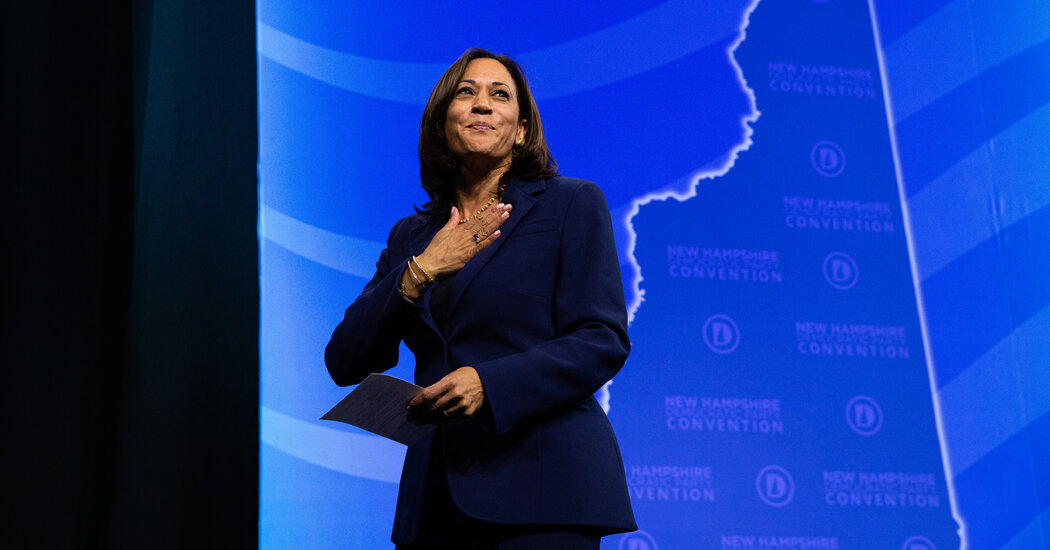Is Kamala Harris proof that America isn't ready for a woman of color as president?
Nov 16, 2019, 5:19 AM ET
Does Harris, a woman who is both black and Indian American, have more difficulty as a candidate than an openly gay mayor, a Hindu Pacific Islander congresswoman, or an Asian American businessman?
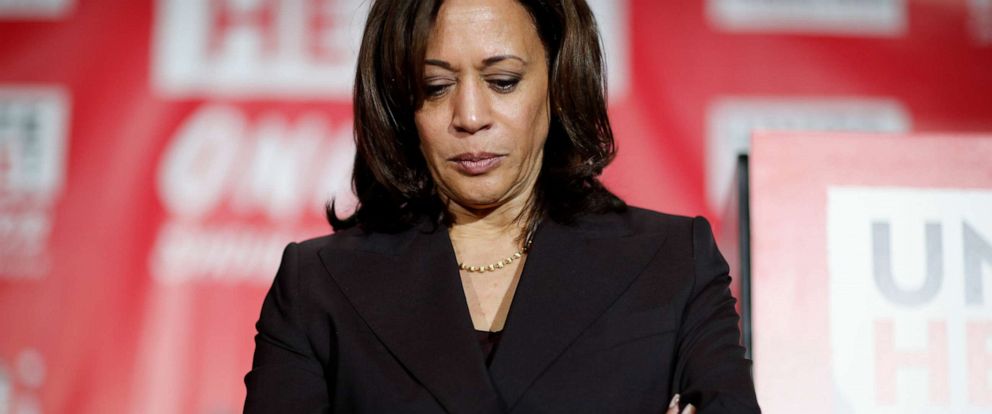
 John Locher/AP
John Locher/AP
WATCHWho is Kamala Harris?
In May, Sen. Kamala Harris stood before the largest chapter of the NAACP and focused her remarks around one subject: electability. Five month later, Harris would call the issue of her electability the “elephant in the room” during an interview with Axios.
Interested in 2020 Elections?
Add 2020 Elections as an interest to stay up to date on the latest 2020 Elections news, video, and analysis from ABC News.
2020 Elections
Add Interest
She wondered aloud if "America was ready for a woman and a woman of color to be president of the United States of America.” It was an issue she brought up on the campaign trail as well. Would her race and gender be a hindrance to her campaign amid the largest group of major contenders the Democratic party has ever seen? Would Harris, a woman who is both black and Indian American, have more difficulty as a candidate than an openly gay mayor, a Hindu Pacific Islander congresswoman, or an Asian American businessman?
(MORE: Sen. Kamala Harris' friends on her upbringing: 'She was one to not let anyone tell her who she was' )
Harris was just five months into her bid for the White House when the California senator went to Detroit at address the NAACP's largest branch in May. She told the packed room that "there has been a lot of conversation by pundits about electability, and who can speak to the Midwest. But when they say that, they usually put the Midwest in a simplistic box and a narrow narrative. And too often their definition of the Midwest leaves people out. It leaves out people in this room who helped build cities like Detroit.”
(MORE: Kamala Harris drops out, then rejoins HBCU event after Trump honor )
The largely African American crowd warmly received Harris’ remarks in the midst of her slow climb up the polls. A month later she would tangle with former Vice President Joe Biden over busing and race at the June presidential debate.
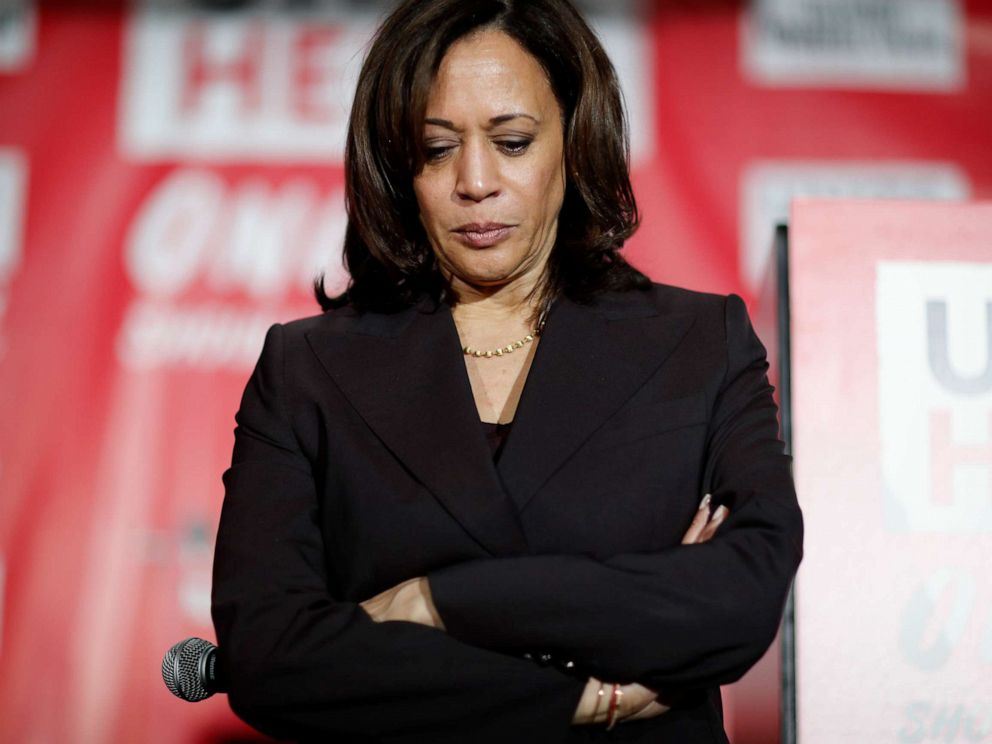 John Locher/AP
John Locher/AP
Democratic presidential candidate Sen. Kamala Harris, D-Calif., pauses as she speaks at a town hall event at the Culinary Workers Union, Friday, Nov. 8, 2019, in Las Vegas.more +
“As the only black person on this stage, I would like to speak on the issue of race,” Harris said that night. She went on to say that “there was a little girl in California who was part of the second class to integrate her public schools, and she was bused to school every day. And that little girl was me.”
That moment on stage in Miami would be end up on a T-shirt with the words, "That little girl was me” -- a T-shirt that would provide a fundraising boon for the California senator.
But that boon would turn into a slow burn.
(MORE: Harris expected to cut staff, slash paychecks in effort to move resources to Iowa)
At the Essence Festival, one of the largest African American events in the country, Harris would double down on her pitch to black voters. But not all black women were on board with Harris. Alicia Jones, a Howard University alumna, told ABC News at the time, “I think that what she did was dirty. And I think she's way beyond and way above what she did.”
“I felt like it was politicizing," Jones, an African American, added. "And so at that point, that took the smart person who I thought she was and took it down a couple of notches.”
Jones, who hasn't finalized her choice for the Democratic primary, told ABC News that race doesn’t play a factor in how she chooses to vote.
“Don't think that I'm a vote for you just because you're black,” she said. “I didn’t vote for Barack Obama just because he was black. I voted for him because he was smart. I voted for him because he had a record that showed me the things that he did. It didn’t matter that he was only a senator for five minutes.”
(MORE: Sen. Kamala Harris kicks off 2020 campaign criticizing Trump and calling for unity)
Leah Wright Rigueur, an assistant professor at Harvard’s Kennedy School of Government, told ABC News that for “most of the country ... gender is not a hindrance to people voting for a political candidate.” On the other hand, she said, “there are elements of sexism, or unique challenges that female candidates face, that male candidates do not.”
Nevertheless, Wright Rigueur noted that black women often do well when they run for office “because they have the ability to unite disparate coalitions into alliances that end up propelling them into office. So you might call them unifiers -- they're very good at unifying various coalitions.”
Wright Rigueur also noted that “black women who run for office operate in spaces that are actually taking advantage of political environments in ways that are different from other groups.” Yet, she said, some of the hesitancy around Harris' electability comes from a pragmatic place. She notes that Harris has had difficulties connecting with audiences beyond her core group of supporters, and only surged following one debate performance.
(MORE: How Kamala Harris Could Win The 2020 Democratic Primary)
In her opinion, Harris’ campaign should be thinking about why Harris isn’t allowing voters to connect with her.
“It can't simply be that she is a black woman,” said Wright Rigueur, pointing to Harris’ struggles in places where she should be polling well, such as her home state of California.
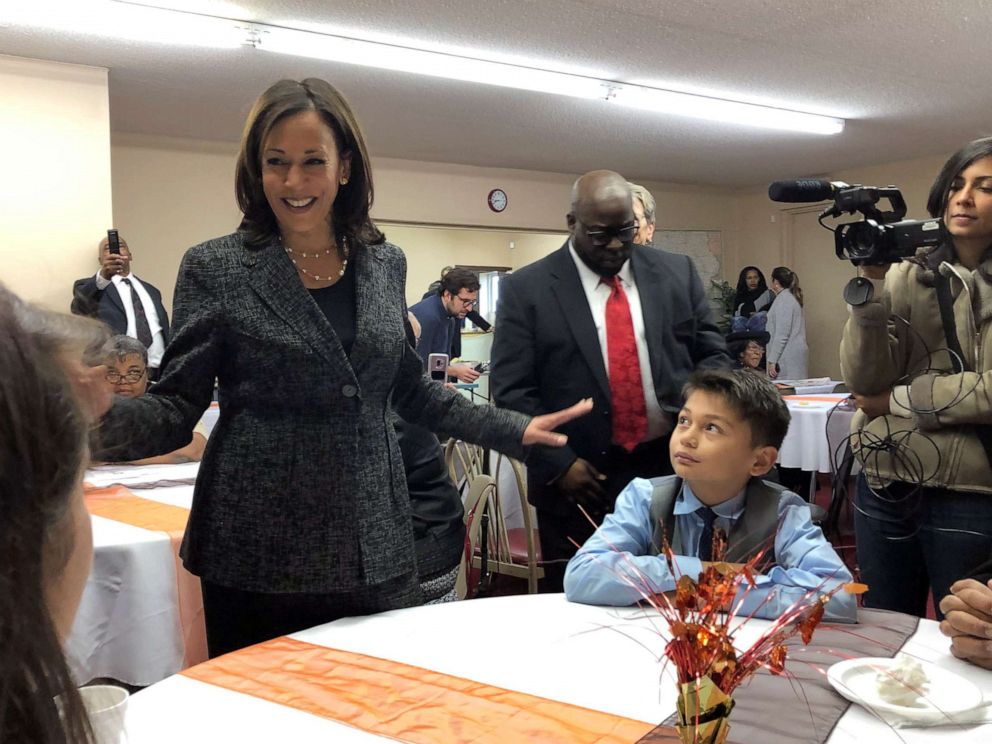 Kathleen Ronayne/AP
Kathleen Ronayne/AP
Democratic presidential candidate Sen. Kamala Harris, D-Calif., speaks to Aaron Nachampassak, 11, right and others at a church congregation breakfast in Fort Dodge, Iowa, on Nov. 10, 2019.more +
In the July debate, fellow 2020 contender Rep. Tulsi Gabbard took aim at Harris’ record as attorney general of California. Gabbard, the only other woman of color in the race, said Harris "put over 1,500 people in jail for marijuana violations and then laughed about it when she was asked if she ever smoked marijuana. She blocked evidence that would have freed an innocent man from death row until the courts forced her to do so." The moment helped elevate Gabbard in the polls, and by fall she was outpolling Harris in some battleground states.
(MORE: Who is running for president in 2020?)
Democratic strategist Atima Omara says there's been a shift in the electorate since the 2016 election. Omara says she’s seen more people willing to consider women of color because voters “realize these women represent a very strong base in the Democratic Party. I do see more receptiveness in the electorate, where there definitely would not have been pre-2016.”
And still, many women of color have to deal with attacks based on outdated stereotypes.
Omara points to former Georgia gubernatorial candidate Stacey Abrams as a high-profile candidate who has been able to overcome many of those challenges, saying, "she's been able to build her political career by being authentic and actually leaning into a lot of who she is.”
(MORE: Harris hits the campaign trail in Iowa: 'This is a pivotal moment')
In late October, Harris announced that she would be cutting some staff and moving staff from several primary states, including New Hampshire, to Iowa in an "organizational realignment to go all-in on Iowa." Days after the announcement, ABC news spoke to several white voters in the Granite state who were all-in for Harris. Marty Parichand said he was very hopeful for Harris' candidacy -- but since Harris pulled resources from the state, it’s more difficult for him to support her candidacy.
Another voter, Jody Goodrich, said Harris was her favorite. And yet, she told ABC News, “I think that she didn't do as well in the debates after that first debate and she kind of faltered. Maybe she just doesn't have the ability to really hang in there.”
Nov 16, 2019, 5:19 AM ET
Does Harris, a woman who is both black and Indian American, have more difficulty as a candidate than an openly gay mayor, a Hindu Pacific Islander congresswoman, or an Asian American businessman?


WATCHWho is Kamala Harris?
In May, Sen. Kamala Harris stood before the largest chapter of the NAACP and focused her remarks around one subject: electability. Five month later, Harris would call the issue of her electability the “elephant in the room” during an interview with Axios.
Interested in 2020 Elections?
Add 2020 Elections as an interest to stay up to date on the latest 2020 Elections news, video, and analysis from ABC News.
2020 Elections
Add Interest
She wondered aloud if "America was ready for a woman and a woman of color to be president of the United States of America.” It was an issue she brought up on the campaign trail as well. Would her race and gender be a hindrance to her campaign amid the largest group of major contenders the Democratic party has ever seen? Would Harris, a woman who is both black and Indian American, have more difficulty as a candidate than an openly gay mayor, a Hindu Pacific Islander congresswoman, or an Asian American businessman?
(MORE: Sen. Kamala Harris' friends on her upbringing: 'She was one to not let anyone tell her who she was' )
Harris was just five months into her bid for the White House when the California senator went to Detroit at address the NAACP's largest branch in May. She told the packed room that "there has been a lot of conversation by pundits about electability, and who can speak to the Midwest. But when they say that, they usually put the Midwest in a simplistic box and a narrow narrative. And too often their definition of the Midwest leaves people out. It leaves out people in this room who helped build cities like Detroit.”
(MORE: Kamala Harris drops out, then rejoins HBCU event after Trump honor )
The largely African American crowd warmly received Harris’ remarks in the midst of her slow climb up the polls. A month later she would tangle with former Vice President Joe Biden over busing and race at the June presidential debate.

Democratic presidential candidate Sen. Kamala Harris, D-Calif., pauses as she speaks at a town hall event at the Culinary Workers Union, Friday, Nov. 8, 2019, in Las Vegas.more +
“As the only black person on this stage, I would like to speak on the issue of race,” Harris said that night. She went on to say that “there was a little girl in California who was part of the second class to integrate her public schools, and she was bused to school every day. And that little girl was me.”
That moment on stage in Miami would be end up on a T-shirt with the words, "That little girl was me” -- a T-shirt that would provide a fundraising boon for the California senator.
But that boon would turn into a slow burn.
(MORE: Harris expected to cut staff, slash paychecks in effort to move resources to Iowa)
At the Essence Festival, one of the largest African American events in the country, Harris would double down on her pitch to black voters. But not all black women were on board with Harris. Alicia Jones, a Howard University alumna, told ABC News at the time, “I think that what she did was dirty. And I think she's way beyond and way above what she did.”
“I felt like it was politicizing," Jones, an African American, added. "And so at that point, that took the smart person who I thought she was and took it down a couple of notches.”
Jones, who hasn't finalized her choice for the Democratic primary, told ABC News that race doesn’t play a factor in how she chooses to vote.
“Don't think that I'm a vote for you just because you're black,” she said. “I didn’t vote for Barack Obama just because he was black. I voted for him because he was smart. I voted for him because he had a record that showed me the things that he did. It didn’t matter that he was only a senator for five minutes.”
(MORE: Sen. Kamala Harris kicks off 2020 campaign criticizing Trump and calling for unity)
Leah Wright Rigueur, an assistant professor at Harvard’s Kennedy School of Government, told ABC News that for “most of the country ... gender is not a hindrance to people voting for a political candidate.” On the other hand, she said, “there are elements of sexism, or unique challenges that female candidates face, that male candidates do not.”
Nevertheless, Wright Rigueur noted that black women often do well when they run for office “because they have the ability to unite disparate coalitions into alliances that end up propelling them into office. So you might call them unifiers -- they're very good at unifying various coalitions.”
Wright Rigueur also noted that “black women who run for office operate in spaces that are actually taking advantage of political environments in ways that are different from other groups.” Yet, she said, some of the hesitancy around Harris' electability comes from a pragmatic place. She notes that Harris has had difficulties connecting with audiences beyond her core group of supporters, and only surged following one debate performance.
(MORE: How Kamala Harris Could Win The 2020 Democratic Primary)
In her opinion, Harris’ campaign should be thinking about why Harris isn’t allowing voters to connect with her.
“It can't simply be that she is a black woman,” said Wright Rigueur, pointing to Harris’ struggles in places where she should be polling well, such as her home state of California.

Democratic presidential candidate Sen. Kamala Harris, D-Calif., speaks to Aaron Nachampassak, 11, right and others at a church congregation breakfast in Fort Dodge, Iowa, on Nov. 10, 2019.more +
In the July debate, fellow 2020 contender Rep. Tulsi Gabbard took aim at Harris’ record as attorney general of California. Gabbard, the only other woman of color in the race, said Harris "put over 1,500 people in jail for marijuana violations and then laughed about it when she was asked if she ever smoked marijuana. She blocked evidence that would have freed an innocent man from death row until the courts forced her to do so." The moment helped elevate Gabbard in the polls, and by fall she was outpolling Harris in some battleground states.
(MORE: Who is running for president in 2020?)
Democratic strategist Atima Omara says there's been a shift in the electorate since the 2016 election. Omara says she’s seen more people willing to consider women of color because voters “realize these women represent a very strong base in the Democratic Party. I do see more receptiveness in the electorate, where there definitely would not have been pre-2016.”
And still, many women of color have to deal with attacks based on outdated stereotypes.
Omara points to former Georgia gubernatorial candidate Stacey Abrams as a high-profile candidate who has been able to overcome many of those challenges, saying, "she's been able to build her political career by being authentic and actually leaning into a lot of who she is.”
(MORE: Harris hits the campaign trail in Iowa: 'This is a pivotal moment')
In late October, Harris announced that she would be cutting some staff and moving staff from several primary states, including New Hampshire, to Iowa in an "organizational realignment to go all-in on Iowa." Days after the announcement, ABC news spoke to several white voters in the Granite state who were all-in for Harris. Marty Parichand said he was very hopeful for Harris' candidacy -- but since Harris pulled resources from the state, it’s more difficult for him to support her candidacy.
Another voter, Jody Goodrich, said Harris was her favorite. And yet, she told ABC News, “I think that she didn't do as well in the debates after that first debate and she kind of faltered. Maybe she just doesn't have the ability to really hang in there.”


